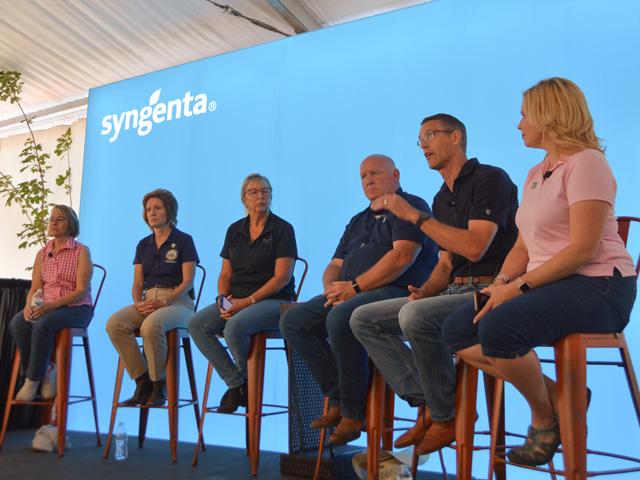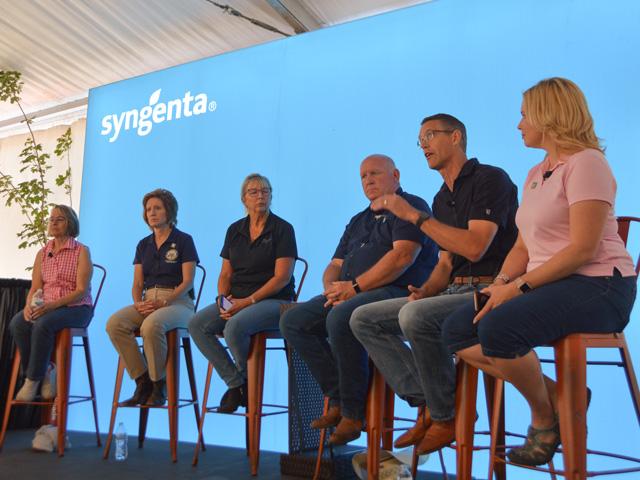Ag Policy Blog
Lawmakers Seeks to Curb Chinese Investments in U.S. Ag
A bipartisan group of lawmakers in Congress have introduced legislation in both chambers seeking to draw more scrutiny to foreign investment in U.S. agriculture, notably by China.
The bill would give the U.S. Department of Agriculture Secretary a permanent seat on the federal Committee on Foreign Investment in the United States (CFIUS).
Both the Syngenta and Smithfield Foods purchases over the last decade sparked similar, failed efforts in Congress to include the USDA Secretary as a permanent member of CFIUS.
The new bill in Congress, the Foreign Adversary Risk Management (FARM) Act, would also require more reporting by USDA and the Government Accountability Office on foreign investments.
China remains the driving force for their bill. In the press release about the bill, Rep. Abigail Spanberger, D-Va., said, "Direct foreign investment in American agriculture and infrastructure has skyrocketed -- and the Chinese Communist Party has driven much of this growth," said Spanberger.
Sen. Tommy Tuberville, R-Ala., added, "Over the past few years, we've seen an alarming increase in foreign purchases of farmland and food companies, particularly by China," Tuberville said. "These foreign investments are now reaching every piece of the very large puzzle that makes up our agriculture industry, from farming and processing, to packaging and shipping. That's why America's agriculture community needs to have a permanent seat at the table when our government vets foreign investment in our country. Adding all parts of the agricultural supply chain to the list of transactions reviewed by CFIUS is the first step toward ensuring America's agricultural suppliers can keep food on tables across the country."
According to USDA, Chinese investors own just under 384,000 acres of U.S. farmland, or less than 1% of all foreign-held farmland. Chinese land ownership did rise by about 31,000 acres from the end of 2020 to the end of 2021, according to the last report by USDA.
USDA's report on foreign ownership of farmland reported about 40 million acres at the end of 2021, up about 2.4 million acres during the year. That trend of 2 million to 3 million acres being bought by foreigners every year continues.
P[L1] D[0x0] M[300x250] OOP[F] ADUNIT[] T[]
Canadians own 12.8 million acres, or about 31% of all foreign-owned agricultural ground. Netherlands owns 12%, Italy owns 7% and the United Kingdom and Germany each own 6%.
Of those 40 million acres, 47% is in forest or timber, or 18.8 million acres. About 11.6 million acres, or 29%, is cropland. Pasture and "other" farmland account for 22%.
USDA's report noted "Iowa is widely considered the state with the strictest prohibitions on foreign ownership of agricultural land, followed by Kansas, Pennsylvania and Wisconsin. States with the weakest protections are Georgia, Maine, New Jersey and Vermont.
Talking about China, Rep. Ashley Hinson, R-Iowa, said earlier this month, "It's hugely concerning to us," during a conference call with reporters. "So we are looking at what mechanisms we can put in place to make sure we're able to adequately track who is buying that, and make sure we are ensuring that the Chinese Communist Party is not able purchase that land."
Those concerns weren't raised last August at the Farm Progress Show when Hinson joined a handful of other GOP lawmakers at a farm bill forum hosted by Syngenta. Since 2017, Syngenta has been owned by ChemChina, a state-owned entity, which bought the Swiss-based seed and chemical company for $43 billion. While based in Switzerland, a large share of Syngenta's business and assets are in the U.S.
The latest hotspot for Chinese ownership of U.S. farm ground has been the efforts by Chinese-based Fufeng Group to build a 25-million-bushel corn mill on the edge of Grand Forks, N.D. CFIUS last month effectively cleared the deal, indicating the purchase was outside the committee's purview.
States are also seeking to tighten their laws on foreign ownership of land.
In Missouri, lawmakers are looking at three bills that would ban or limit foreign ownership of farm ground. One bill would ban ownership by individuals or businesses from China, Iran, North Korea, Russia and Venezuela.
The new legislation in Missouri comes a decade after Missouri lawmakers changed a law in the state that allowed Chinese-based WH Group to buy Smithfield Foods for $4.7 billion, including its Missouri assets, which involved packing plants and hog facilities that had once been owned by Farmland Foods. The change in legislation in 2013 allowed WH Group to take ownership of about 40,000 acres of farmland in Missouri.
Critics of the new bill in Missouri point out it would bar foreign ownership of residential properties, which would hurt companies such as Bayer -- based in Germany -- but has a large presence in the St. Louis area, according to the St. Louis Post-Dispatch.
Similar legislation is being championed in Florida, South Dakota and Texas. Gov. Greg Abbott said he would sign a bill similar to at least one of the Missouri bills. It would ban citizens and foreign entities from China, Iran, North Korea and Russia from buying land in Texas. The South Dakota bill would create a new committee to look at foreign investment in the state.
See, "Members of Congress and Florida's Governor Push to Ban Chinese Land Purchases," https://www.dtnpf.com/…
Also see, " Federal Committee Says Chinese Company Fufeng Can Move Ahead With North Dakota Corn Mill," https://www.dtnpf.com/…
Chris Clayton can be reached at Chris.Clayton@dtn.com
Follow him on Twitter @ChrisClaytonDTN
(c) Copyright 2023 DTN, LLC. All rights reserved.






Comments
To comment, please Log In or Join our Community .